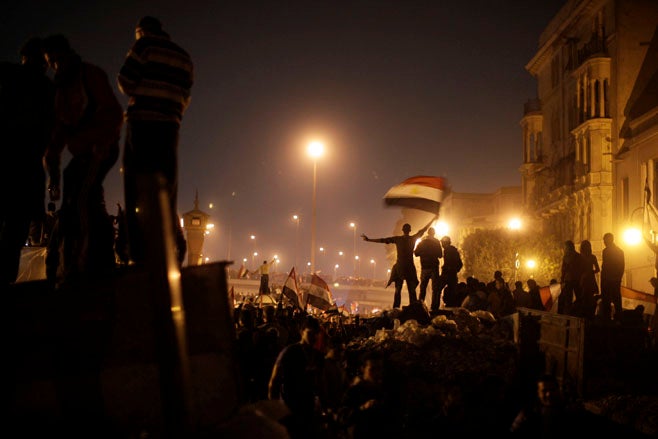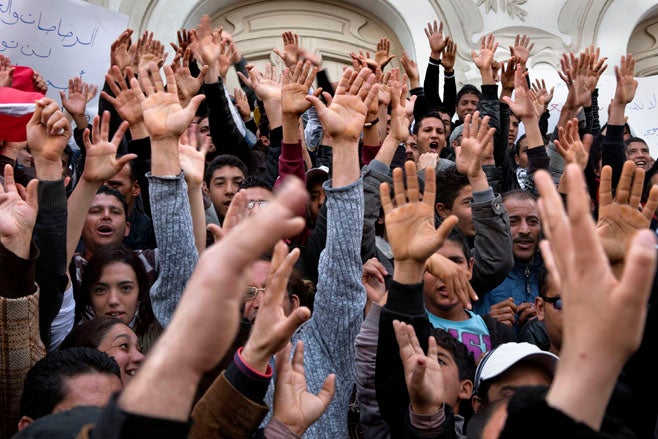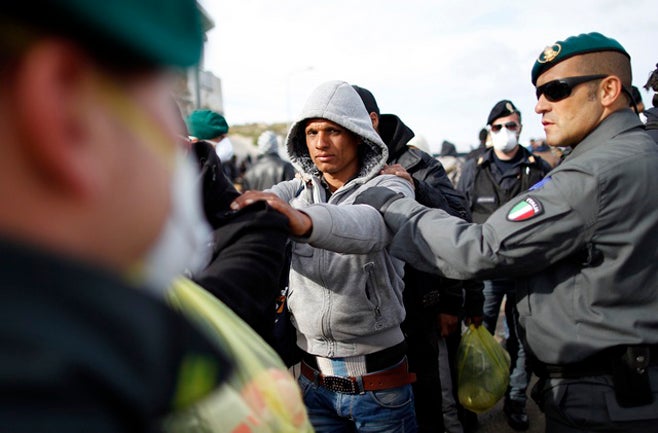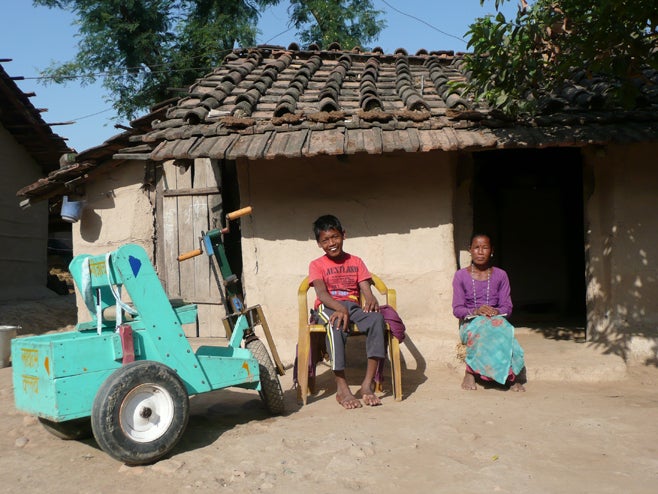The December 2010 presidential election resulted in victory for Alyaksandr Lukashenka, who has ruled the country for the last 16 years. The Organization for Security and Co-operation in Europe (OSCE) found the election to be flawed, crushing hopes for democratic progress in Belarus. On election night riot police beat and arrested hundreds of largely peaceful protesters. Over 40 were imprisoned, although in apparent response to international pressure the government released many throughout the year.
In the following months the authorities unleashed a harassment campaign, targeting human rights defenders, political activists, journalists, and lawyers. Severe restrictions on freedoms of association, assembly, and media remain and the level of repression is unprecedented.
In August 2011 prominent Belarusian human rights defender Ales Bialiatski was arrested on politically motivated charges of tax evasion.
December 2010 Post-Election Unrest and Political Prisoners
On the night of December 19, tens of thousands of demonstrators took to the streets of Minsk, the capital, protesting what they felt was another stolen election. Riot police violently dispersed the largely peaceful demonstration, beating everyone within reach. They arrested more than 700 protesters, including dozens of journalists and seven presidential candidates. Hundreds served up to 15 days in detention for misdemeanor charges of “hooliganism.” A coalition of independent human rights NGOs in Minsk who documented the crackdown found that hundreds of detainees alleged abuse while in police custody, including beatings, no access to food and water, and being forced to sign police reports containing false information about the circumstances of their arrest.
Trials were held behind closed doors and marred by multiple due process violations. Most defendants had no access to defense counsel and were not allowed to callwitnesses. There were no acquittals.
Belarusian authorities sought to portray the December unrest as an attempt, planned by the opposition and foreign states, to overthrow the government.
More than 40 persons—including journalists, civil society leaders, and five former presidential candidates—were sentenced to up to six years of imprisonment on trumped-up rioting charges. The NGO coalition found that detainees were held in poor detention conditions, in virtual isolation from the outside world, and had severely restricted access to legal counsel at all stages of detention and trial. Human rights monitors reported that those accused of rioting or public disorder were convicted despite lack of evidence of engaging in or inciting violence.
There continue to be allegations of serious psychological and physical abuse and due process rights violations of political prisoners who remain in custody. Many are routinely denied meetings with their lawyers. They often do not receive correspondences and are prohibited from family visits. Some are repeatedly placed in solitary confinement or punishment cells without justification and some are denied medical care.
Human Rights Defenders, Civil Society Groups, and Lawyers
In the weeks following the December protests, state security forces repeatedly raided offices of human rights groups, confiscating equipment, interrogating staff, and arresting those suspected of participating in pro-democracy protests. Human rights NGOs report several cases of politically motivated expulsions from universities and dismissals from public sector jobs.
Involvement in an unregistered organization constitutes a criminal offense under Belarusian law. The authorities continue to routinely deny registration to most civil society groups for arbitrary reasons, making activists constantly vulnerable to prosecution.
In January and June 2011 the Belarusian Helsinki Committee, Belarus’s only nationally registered human rights group, received two politically motivated warnings from the Ministry of Justice. Under Belarusian law, two official warnings may lead to suspension of an organization’s activities.
In August Ales Bialiatski, vice-president of the International Federation for Human Rights (FIDH)and head of the Human Rights Centre Viasna (Viasna), an independent human rights group, was arrested on criminal charges of large-scale tax evasion, after Lithuanian and Polish authorities released details of his personal bank accounts to Belarusian authorities. Viasna used the funds, received from international donors, for legal and financial assistance for political prisoners and their families in Belarus.
Authorities withdrewViasna’s registration in 2003 and have since routinely denied it registration. As a result, Viasna cannot open a bank account in Belarus.
In 2011, authorities expelled or banned from entering Belarus an unprecedented 13 foreign human rights defenders, seriously impeding independent monitoring of the human rights situation in the country.
The authorities consistently targeted lawyers representing clients charged in connection with the December events. The Ministry of Justice arbitrarily disbarred or revoked the licenses of seven lawyers, a clear warning to lawyers against taking on “political” cases. Lawyers who represent political prisoners continue to face difficulties accessing their clients, resulting in some individuals being left without legal counsel.
Freedom of Peaceful Assembly
Belarusian authorities continue to severely curtail the right to assemble peacefully. In 2011 the political opposition held “silent” demonstrations to protest Lukashenka’s government or express support for political prisoners. Police disperse, sometimes harshly, protesters who do nothing more than stroll silently or clap their hands. Many were sentenced to up to 15 days of administrative detention for “hooliganism.” In October the Belarusian parliament adopted restrictive amendments to a number of laws that seemed aimed at banning silent demonstrations. The amendments included restrictions on where demonstrations can be held, and introduced a more complicated procedure for obtaining permits for public gatherings. Also according to the new legislation, actions directed at spreading or sharing information about a planned gathering may constitute an offense unless the gathering had already been approved by the authorities.
Freedom of Media
The government continued to severely restrict freedom of media. The authorities routinely threatened the independent print media, and on several occasions blocked social media and other websites. Police arrested dozens of journalists covering pro-democracy protests in December and the later “silent” protests. For example, in May 2011 a court handed independent journalist Iryna Khalip a two-year suspended sentence on trumped-up riot charges in connection with the December protests. In May the authorities initiated closure proceedings for the independent newspapers Nasha Niva and Narodnaya Vola. Although legal proceedings were discontinued in August, both newspapers received fines for trumped-up violations of media law. In July a court convicted Andrzej Poczobut, a correspondent for the Polish newspaper Gazeta Wyborcza, for defaming Lukashenka. In his articles Poczobut called President Lukashenka a dictator. He was handed a three-year suspended sentence. In September a higher court upheld the conviction.
Death Penalty
In July 2011 Belarusian authorities executed two individuals, despite the United Nations Human Rights Committee’s request to not carry out the executions pending the committee’s review of their cases. Both men, convicted of murder, admitted their guilt but alleged they were tortured during interrogations. The committee deplored their executions, stating that Belarus violated its international obligations by imposing death sentences on individuals whose right to fair trial may have been violated.
Key International Actors
Many foreign governments and international organizations condemned the post-election crackdown and expressed concern over the deepening human rights crisis in Belarus.
In December 2010 Hillary Clinton, United States secretary of state, and Catherine Ashton, European Union representative for foreign affairs and security policy/ vice-president of the European Commission, issued a joint statement calling the election “an unfortunate step backwards” in the democratic development of Belarus. In January 2011 the foreign ministers of Germany, Sweden, Poland, and the Czech Republic issued a joint statement condemning the post-election crackdown.
In January the EU and the US imposed new financial and travel sanctions against the Belarusian government. The US significantly extended the list of Belarusian top-ranking officials subject to visa bans and travel restrictions, but did not specify how many officials were affected by the limitations. In August the US imposed new economic sanctions against four major state-owned Belarusian companies.
In 2011 the European Parliament adopted four resolutions on the human rights situation in Belarus. In its resolution on Belarus adopted in January, the European Parliament expressed its dismay at the “unprecedented wave of violence, intimidation, mass arrests, and prosecution of political opponents.”
In February 2011 UN Secretary-General Ban Ki-moon expressed concern about “reports of harassment and continued detention of journalists, civil society activists and opposition candidates” and called for their release.
In June 2011 the UN Human Rights Council adopted a resolution condemning violations in Belarus, and called on the high commissioner for human rights to monitor the human rights situation and report to the Council during the following sessions. The resolution also encouraged relevant UN thematic special procedures mandate holders to pay particular attention to the human rights situation in Belarus.
During her speech at the Eastern Partnership summit in September, German Chancellor Angela Merkel called the government’s actions against opposition “unacceptable.”
In contrast, Russia has condemned international sanctions against Belarus, calling them “counterproductive.” In August 2011 Russian Prime Minister Vladimir Putin announced that in 2012 Russia will supply gas to Belarus at a discount price as a sign of support.
In response to international pressure, Lukashenka’s government gradually released some political prisoners. In January 2011 Belarusian authorities released several of the detainees facing riot charges and transferred several others to house arrest. In March they re-classified riot charges against six detainees to less serious offences. Between June and August the authorities pardoned 13 individuals who were convicted in relation to December events; most, however, had to admit guilt as a condition of their release.
In an unexpected public statement in August, Lukashenka called on opposition leaders to join him in a strategic discussion on leading Belarus out of political and economic crises. In September, 11 more political prisoners were released after being granted a presidential pardon.
Meanwhile the Belarusian government ignored international requests to restore the OSCE mandate in Belarus, which it discontinued in January, following the organization’s critical assessment of the December election. Lukashenka’s government also refused to cooperate with the Moscow Mechanism, the OSCE’s only existing monitoring mechanism that does not require consensus. The OSCE imposed the procedure in April.






